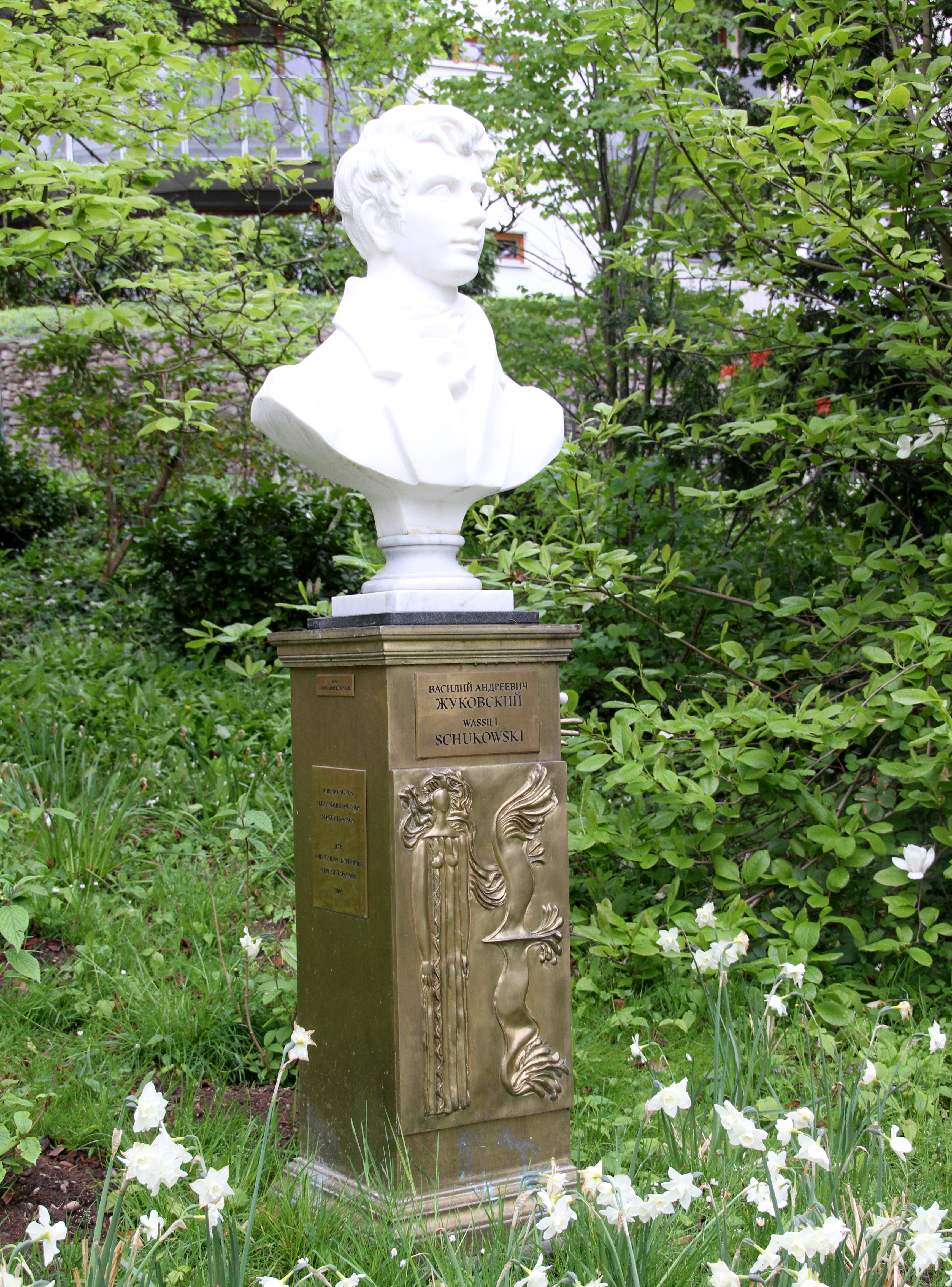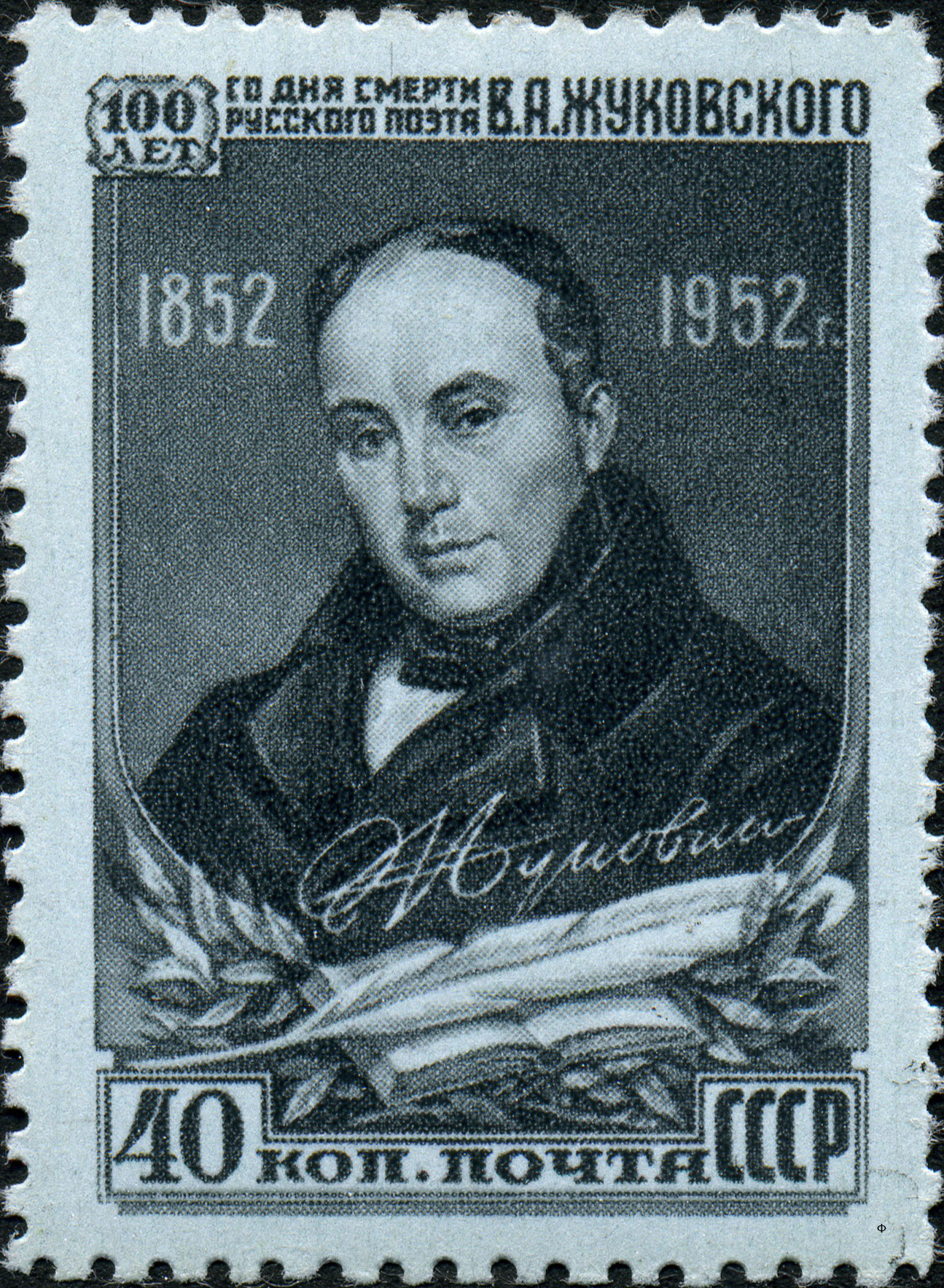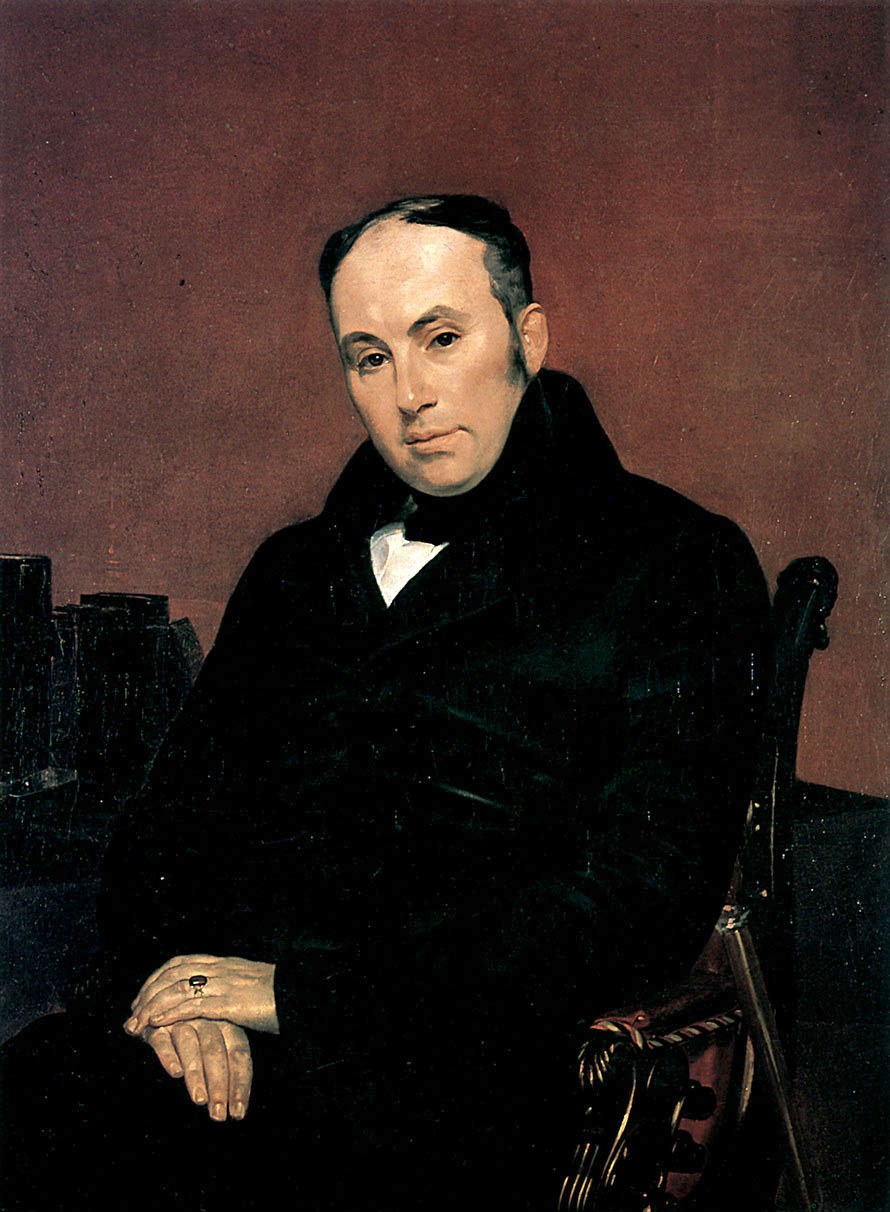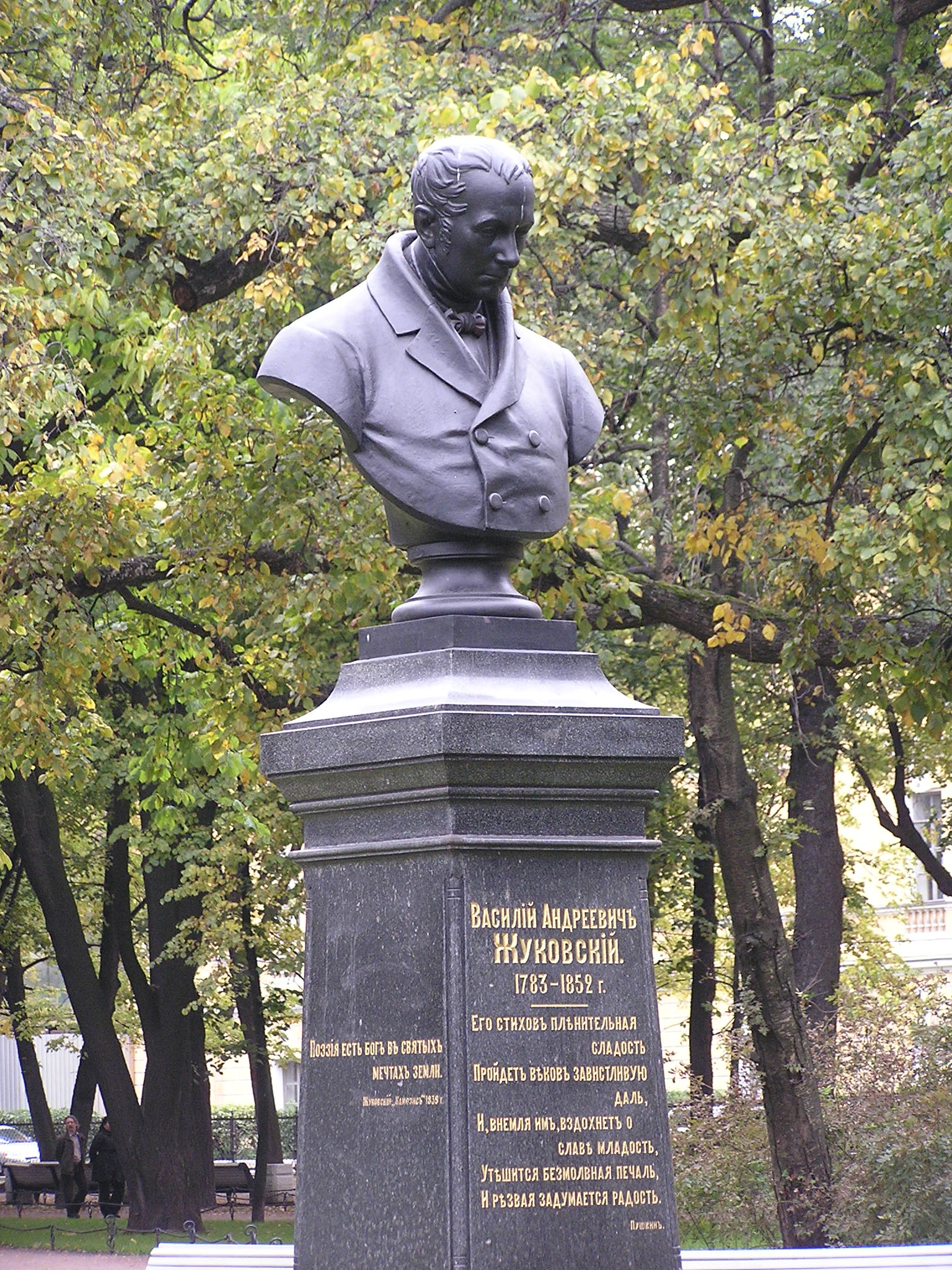1. Early Life and Background
Vasily Zhukovsky's early life and educational journey laid the groundwork for his distinguished literary career, shaping his intellectual and stylistic inclinations.
1.1. Birth and Childhood
Vasily Andreyevich Zhukovsky was born on February 9, 1783 (Old Style: January 29), in the village of Mishenskoe within the Tula Governorate of the Russian Empire. He was the illegitimate son of Afanasi Bunin, a wealthy landowner, and his housekeeper, Salkha. Salkha was a Turkish woman who had been captured during the siege of Bender in 1770 and brought to Russia as a slave. She later underwent baptism and was effectively welcomed into the Bunin household under the name Elizaveta Dementieva Turchaninova. Despite being raised within the Bunin family circle, the infant poet was formally adopted by a family friend, the lower-ranking nobleman Andrey Grigorievich Zhukovsky, for reasons of social propriety. He retained this adopted surname and patronymic throughout his life. The Bunin family had a literary inclination, and some 90 years later, it produced the Nobel Prize-winning modernist writer Ivan Bunin.
1.2. Education and Early Influences
At the age of fourteen, Zhukovsky was sent to Moscow to be educated at the Moscow University's boarding school for noblemen, where he distinguished himself as an excellent student. During his time there, he became deeply influenced by the mystical philosophy of Freemasonry and the fashionable literary trends of English Sentimentalism and German Sturm und Drang. He also developed a passion for painting and foreign languages. It was during this formative period that he met Nikolay Karamzin, a preeminent Russian man of letters and the founding editor of the influential literary journal of the day, Vestnik Yevropy (The Herald of Europe). Karamzin's influence played a significant role in shaping Zhukovsky's early literary thought and career.
2. Early Literary Career
Zhukovsky's early literary endeavors marked his emergence as a prominent voice in Russian literature and were instrumental in establishing the Romantic movement in Russia.
2.1. Literary Debut and Editorial Work
In December 1802, at the age of 19, Vasily Zhukovsky made his literary debut by publishing a free translation of Thomas Gray's "Elegy Written in a Country Churchyard" in Nikolay Karamzin's journal, Vestnik Yevropy. This translation immediately garnered significant public attention and is widely cited by scholars as the conventional starting point for the Russian Romantic Movement. Its striking originality in Russian, characterized by a sentimental-melancholy style, made him widely known among Russian readers. His translation of Gray's "Elegy" is still considered by some to be unparalleled, even more than two centuries later. In 1808, recognizing his talent and growing reputation, Karamzin asked Zhukovsky to take over the editorship of Vestnik Yevropy. Zhukovsky utilized this position to explore and introduce Romantic themes, motifs, and genres into Russian literature, primarily through his extensive and innovative translations.
2.2. Establishment of Russian Romanticism
Zhukovsky played a pivotal role in fostering the Russian Romantic literary movement. He was among the first Russian writers to cultivate the mystique of the Romantic poet. In 1815, shortly after moving to Saint Petersburg, he established the jocular Arzamas literary society. This society aimed to promote Karamzin's European-oriented, anti-classicist aesthetics and was crucial in advancing the cause of Romanticism in Russia. Members of the Arzamas included the teenage Alexander Pushkin, who rapidly emerged as Zhukovsky's poetic heir apparent. Despite Pushkin eventually surpassing Zhukovsky in terms of originality and brilliance, the two remained lifelong friends. The older poet served as a crucial literary mentor and protector for Pushkin at court. Zhukovsky's original works were often inspired by his half-niece, Maria "Masha" Protasova, with whom he shared a passionate yet ultimately platonic affair, leading to significant love lyrics. He also came under the influence of Romanticism through the medieval Hansa cities of Dorpat (now Tartu) and Revel (now Tallinn), which were then part of the Russian Empire, where the German-speaking university in Dorpat provided a fertile ground for such influences.
3. Court Life and Social Contributions
Vasily Zhukovsky's roles within the Russian imperial court significantly broadened his influence beyond literature, allowing him to contribute to national events and advocate for progressive ideals.
3.1. Involvement in War and Patriotism
Zhukovsky's rise at court notably began during Napoleon's invasion of 1812, which ignited a fervent wave of patriotism and a consequent decline in the favorability of French as the dominant foreign language among the Russian aristocracy. Like thousands of other Russians, Zhukovsky volunteered for the defense of Moscow and was present at the pivotal Battle of Borodino. There, he joined the Russian general staff under Field Marshal Kutuzov, where he was tasked with propaganda and morale-boosting efforts. During this period, he produced a burst of patriotic poetic works, including the acclaimed ode "A Bard in the Camp of the Russian Warriors" (Певец во стане русских воиновRussian), which garnered significant praise at court. His contributions also extended to composing the lyrics for the Imperial Russian national anthem, "God Save the Tsar!" (Боже, Царя храни!Russian). Following the war, he temporarily settled in the village of Dolbino near Moscow, where a period of intense poetic creativity in 1815 became known as the Dolbino Autumn.
3.2. Imperial Tutor and Influence on Reforms
Zhukovsky's patriotic works attracted the attention of Grand Duchess Alexandra Feodorovna, the German-born wife of Grand Duke Nicholas (the future Tsar Nicholas I), who invited him to Saint Petersburg to be her personal Russian tutor. This pedagogical career, while somewhat removing him from the immediate literary forefront, elevated him to one of Russia's most powerful intellectuals. Shortly after Nicholas ascended the throne, he appointed Zhukovsky as tutor to the Tsarevich Alexander, who would later become Tsar Alexander II. Zhukovsky's progressive educational methods profoundly influenced the young Alexander, so much so that many historians attribute the significant liberal reforms of the 1860s, including the abolition of serfdom, at least partially to his pedagogical philosophy. Many of Zhukovsky's best translations from German, particularly those of Goethe, were initially undertaken as practical language exercises for Alexandra.
3.3. Advocacy for Liberal Intellectuals and Literary Patronage
Leveraging his high station at the imperial court, Zhukovsky became a crucial advocate for liberal-minded writers and intellectuals who often found themselves in political difficulties. He notably intervened on behalf of free-thinking literary figures such as Mikhail Lermontov, Alexander Herzen, and Taras Shevchenko. In the case of Shevchenko, Zhukovsky played an instrumental role in securing his freedom from serfdom. His good personal relations with Nicholas I protected him from the fate of other liberal intellectuals following the ill-fated Decembrist Revolt of 1825. Furthermore, after Alexander Pushkin's untimely death in 1837, Zhukovsky stepped in as his literary executor, diligently collecting and preparing Pushkin's works for publication, including rescuing several unpublished masterpieces from hostile censorship. Throughout the 1830s and 1840s, he also actively promoted the career of Nikolay Gogol, another close personal friend. Through these efforts, Zhukovsky acted as an impresario, fostering and protecting the burgeoning Russian Romantic movement and its key figures.
4. Major Literary Works and Achievements
Vasily Zhukovsky's literary output is characterized by both innovative translations that enriched Russian literature and original poetic works that defined the Romantic sensibility of his era.
4.1. Innovation in Translation
Zhukovsky's main contribution to Russian literature was as a stylistic and formal innovator, primarily through his extensive and free translations. He borrowed liberally from European literature to provide high-quality models for "original" works in Russian. His 1802 translation of Thomas Gray's "Elegy Written in a Country Churchyard" is widely considered the conventional starting point for the Russian Romantic Movement. He was especially admired for his first-rate, melodious translations of German and English ballads. Among these, "Ludmila" (1808) and its companion piece "Svetlana" (1813) are regarded as landmarks in Russian poetic tradition. Both are free translations of Gottfried August Bürger's well-known German ballad "Lenore", though each offers a completely different rendering of the original. Characteristically, Zhukovsky later translated "Lenore" yet a third time as part of his lifelong effort to develop a natural-sounding Russian dactylic hexameter.
He translated a staggeringly wide range of sources, from ancient poets like Ferdowsi (from whose Shahnameh he translated long excerpts) and Homer to his contemporaries Goethe, Schiller, Byron, and others. His many translations of Schiller, including classical and Romantic ballads, lyrics, and the verse drama Die Jungfrau von Orléans (about Joan of Arc), became classic works in Russian. These translations are often considered by many to be of equal, if not higher, quality than their originals, noted for their psychological depth. They strongly influenced the younger generation of Russian realists, including Dostoevsky, who famously referred to them as "nash Schiller" ("our Schiller"). He also translated Cervantes' Don Quixote from French and the ancient Russian epic The Tale of Igor's Campaign (Слово о Полку ИгоревеRussian) into modern Russian.
In the late 1830s, after a period of partial withdrawal from the literary scene, Zhukovsky staged a comeback with a highly original verse translation of his German friend Friedrich de la Motte Fouqué's prose novella Undine. Written in a waltzing hexameter, Zhukovsky's version, known as Undina, later inspired the libretto for an opera by Pyotr Ilyich Tchaikovsky. His greatest achievement in translation was his rendering of Homer's Odyssey, which he finally published in 1849. Although this translation has been criticized for its distortions of the original text, it became a classic in its own right and holds a notable place in the history of Russian poetry. Some scholars argue that both his Undina and his Odyssey-as long narrative works in verse-made a significant, albeit indirect, contribution to the development of the 19th-century Russian novel. All in all, Zhukovsky's work constitutes probably the most important body of literary hermeneutics in the modern Russian language.
4.2. Original Poetry and Prose
In addition to his prolific translations, Zhukovsky also composed significant original verse. His love lyrics dedicated to Maria Protasova, such as "Moi drug, khranitel'-angel moi" (My friend, my guardian angel...), are considered minor classics of the genre. Perhaps his best-known original poem is the patriotic ode "A Bard in the Camp of the Russian Warriors" (Певец во стане русских воиновRussian), which he wrote to boost the morale of Russian troops during his service on Field Marshal Kutuzov's general staff in 1812. He also famously composed the lyrics for the national anthem of Imperial Russia, "God Save the Tsar!" (Боже, Царя храни!Russian). His prose writings include the 1809 short story "Marina roshcha" (Марьина рощаRussian, "Mary's grove"), which delves into the ancient past of Moscow and was inspired by Nikolay Karamzin's famous story "Poor Liza" (1792). Other notable original works include lyrical pieces like "Evening" (ВечерRussian, 1806), "The Sea" (МореRussian, 1822), and "To Her" (К нейRussian, 1811), as well as patriotic odes, and idylls.
5. Personal Life
Beyond his public and literary roles, Vasily Zhukovsky's personal life included a late marriage, family, and extensive travels across Europe.
5.1. Marriage and Family
In 1841, at the age of 58, Vasily Zhukovsky retired from court and settled near Düsseldorf, Germany. There, he married Elisabeth von Reutern, the 18-year-old daughter of his artist friend, Gerhardt Wilhelm von Reutern. The couple had two children: a daughter named Alexandra and a son named Pavel. Alexandra later became known for her much-talked-about affair with Grand Duke Alexei Alexandrovich, a son of Tsar Alexander II.
5.2. European Travels and Retirement
Like his mentor Karamzin, Zhukovsky traveled widely across Europe, with a particular focus on the German-speaking world. His connections with the Prussian court in Berlin granted him access to high society in various spa-towns such as Baden-Baden and Bad Ems. During his travels, he met and corresponded with world-class cultural figures, including the renowned poet and playwright Johann Wolfgang von Goethe, the poet Ludwig Tieck, and the celebrated landscape painter Caspar David Friedrich. After his retirement from court in 1841, he spent his remaining years primarily in Germany with his family.
6. Death
Vasily Zhukovsky died in Baden-Baden, Germany, on April 24, 1852 (Old Style: April 12), at the age of 69. His body was subsequently returned to Saint Petersburg, Russia, where he was interred in the Alexander Nevsky Lavra. His crypt is notably located directly behind the monument dedicated to the famed author Fyodor Dostoevsky.
7. Legacy and Assessment
Vasily Zhukovsky's historical and literary legacy is profound, characterized by his foundational contributions to Russian Romanticism and enduring influence, despite some critical perspectives.
7.1. Positive Assessment and Contributions
Zhukovsky is widely celebrated as a founder of Russian Romanticism, significantly shaping the literary landscape of the 19th century. His contributions as a stylistic and formal innovator, who freely adapted from European literature to create high-quality models for original Russian works, were paramount. His translation of Thomas Gray's "Elegy Written in a Country Churchyard" is often cited as the conventional starting point for the Russian Romantic Movement, marking a new era in Russian poetry. He is also credited with significant contributions to the reform and development of the Russian language, making it more flexible and capable of expressing complex emotions and ideas. Furthermore, his work constitutes the most important body of literary hermeneutics in the modern Russian language, providing frameworks for understanding and interpreting literary texts. He is often considered the founder of a "German school" of Russian poets, highlighting his deep engagement with German Romanticism and its influence on his work. The critic Vissarion Belinsky referred to Zhukovsky as the "Christopher Columbus of Russian literature," acknowledging his pioneering role, while Alexander Pushkin affectionately called him the "nursemaid" of poets, recognizing his nurturing influence on emerging literary talents. Vladimir Nabokov praised him as "a wonderful translator, who surpassed both Seidlitz and Schiller in his versions of their poems, and one of the greatest minor poets that ever was."


7.2. Criticism and Controversy
While largely lauded for his extensive contributions, Zhukovsky's literary output was not without criticism. His hexameter translation of Homer's Odyssey, published in 1849, for instance, received strong criticism for its perceived distortions of the original Greek text. Despite these criticisms regarding fidelity to the source, the translation nonetheless gained classical status in its own right and holds a notable place in the history of Russian poetry due to its melodic quality. There are no other widely noted significant controversies related to his actions or works in historical or literary discourse.
8. Influence
Vasily Zhukovsky's influence permeated various aspects of Russian society, from shaping literary movements to contributing to educational and social reforms.
8.1. Influence on Later Literature
Zhukovsky's specific impact on subsequent Russian writers and literary movements was profound and widespread. His groundbreaking work in translation, particularly of Schiller's poems, deeply influenced the younger generation of Russian realists, including Dostoevsky, who considered Schiller's works in Zhukovsky's renditions as "our Schiller." He played a crucial role in the development of Alexander Pushkin's poetic voice, acting as a mentor and protector, and the dedication on the portrait Pushkin received from Zhukovsky, "To the victorious disciple from his vanquished tutor," symbolizes this transfer of literary leadership. His work, particularly his long narrative verse translations like Undina and Odyssey, is considered by some scholars to have made a significant, albeit indirect, contribution to the development of the 19th-century Russian novel. Furthermore, his foundational work in Russian literary hermeneutics and his establishment of a "German school" of Russian poets influenced figures as far afield as Fyodor Tyutchev and Marina Tsvetaeva.
8.2. Social and Educational Impact
Beyond the literary sphere, Zhukovsky's broader societal and educational influence was substantial, particularly through his prominent role as an imperial tutor. His progressive pedagogical ideas, instilled in the future Tsar Alexander II, are often credited by historians as contributing to the liberal reforms implemented in Russia during the 1860s, notably the abolition of serfdom. By advocating for and protecting liberal-minded writers such as Mikhail Lermontov, Alexander Herzen, and Taras Shevchenko, Zhukovsky used his high court position to foster an environment conducive to intellectual freedom and social progress, thereby shaping the intellectual and moral landscape for future generations.
9. Commemoration


Vasily Zhukovsky is commemorated through various monuments, memorials, and public recognitions that honor his significant contributions to Russian literature and society. A bust of Zhukovsky can be found in Baden-Baden, Germany, where he spent his final years and passed away. His image was also featured on a 1952 stamp issued by the Soviet Union, recognizing his lasting legacy. In Saint Petersburg, a monument dedicated to him stands in the Alexander Garden (also known as the Imperial Garden), reflecting his importance in Russian cultural history. His burial site in the Alexander Nevsky Lavra in Saint Petersburg, directly behind the monument to Fyodor Dostoevsky, further highlights his esteemed place among Russia's literary giants.